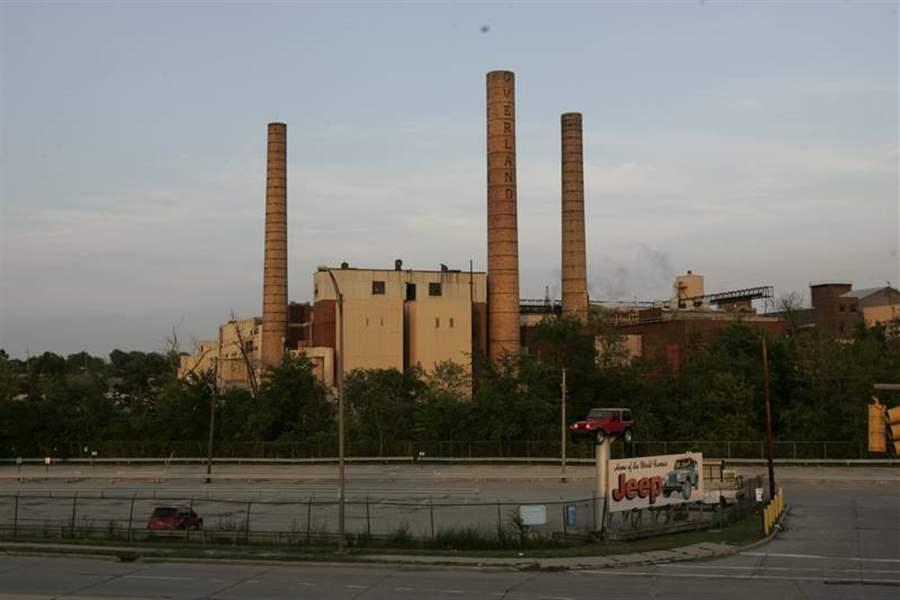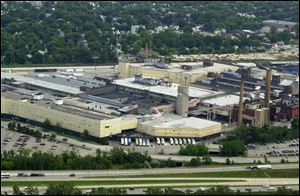
Nation s longest-operating auto plant faces final days
6/25/2006
Markings on two of the Jeep Parkway plant's smokestacks are a reminder of its early history.
For more than 80 years, two smokestacks bearing Overland spelled out in brick have towered over Toledo s Jeep Parkway plant, a remnant of the auto company that started the massive complex in 1910.
But like Willys-Overland Motor Co., what remains of the nation s longest-operating auto plant will become defunct this week and eventually torn down, wrenching the hearts of workers and retirees such as Lucy Bonilla, Barbara Wawrzyniak, and Marv Machinski. Retirees such as Bob Thompson, however, look to the future.
About a third of Jeep Parkway was demolished in 2002, and a time line for the rest including the circa-1920 smokestacks, visible from I-75, which generations of local residents identify with has not been determined, a company spokesman told The Blade last week.
It s like losing an old friend, said Mrs. Bonilla of Toledo, a 53-year-old retiree who lived close enough to walk to work her first two years.

Bemoaned fellow retiree Mrs. Wawrzyniak, 68, of Toledo: You won t see the smokestacks anymore.
Jeep Parkway has churned out roughly 11 million vehicles in the last 96 years, starting with Overland and Willys-Knight cars and ending with the direct descendant of the World War II vehicle that made the plant famous.
Production of the latest incarnation of that vehicle, the 2007 Jeep Wrangler, will start next month at a $900 million, multifactory complex a few miles away.
Toledo Jeep, owned by DaimlerChrysler AG, has had two main factory sites for decades, the Parkway and Stickney Avenue factory that make Wranglers.
More recently, the Chrysler Drive plant next to the Stickney factory has made Jeep Libertys. With the completion of the new factories adjacent to the Stickney and Chrysler Drive plants, all Wranglers and Libertys will be made at that location, along with a new vehicle this summer, the Dodge Nitro.
Changing times
Dan Henneman, chairman of United Auto Workers Local 12 s Jeep unit, likened that transition to experiencing sorrow from burying a grandfather one week and joy from welcoming a newborn the next. Union and company officials plan to commemorate Parkway s last week with workers and give them mementoes.
It s an end of an era for us, Mr. Henneman told The Blade. It s sad, but time s changing.
Among those who have accepted that change is retiree Bob Thompson, who started at Jeep Parkway in 1943 and worked 45 years.

They ve got the new plant, the 80-year-old Toledoan said. It s being replaced.
Speculation about Jeep Parkway s demise started cropping up decades ago as ownership of the factory and the Toledo-born Jeep brand continued changing. Nationwide, more efficient one-story factories were supplanting multistoried assembly plants such as Parkway, prompting more fears.
But the popularity of the sport utility vehicle, a segment arguably launched in 1983 by the long-lived Jeep Cherokee, helped keep Jeep Parkway viable despite its age, said Bob Casey, transportation curator for The Henry Ford in Dearborn, Mich.
Anywhere you were building them was a good place, Mr. Casey said of SUVs.
Indeed, General Motors Corp. has what will become after this week the oldest auto plant in the country, a factory in Janesville, Wis., that makes Chevrolet Suburbans, Chevrolet Tahoes, and GMC Yukons. Built in 1920, that SUV factory is escaping the automaker s latest round of cutbacks.
A piece of history
Part of Jeep Parkway was shuttered in 2001 and later demolished after the Cherokee was replaced with the Jeep Liberty, which is built in the five-year-old Toledo North assembly plant. That demolition included buildings where World War II Jeeps were made.
Jeep Parkway s construction started in 1910 after John North Willys started expanding the Pope Motor Car Co. plant he bought the year before. The only remaining Pope Motor building, built about 1885 by Jewel Sewing Machine Co. on Central Avenue, was sold around the 1940s.
During World War II, the plant not only made Jeeps but trailers, 155mm shells, aircraft parts, rockets, and other military equipment. Jeep House Museum, opened at the plant in 1984, preserved Parkway s history through photographs, vehicles, and other collections, but the building was part of what was demolished a few years ago.
About half of the museum s contents were on loan and returned to owners, while the rest was saved by Chrysler.

Jeep Parkway, as it appeared in 2000, has churned out roughly 11 million vehicles during the last 96 years.
Recently, automaker officials toured remaining Parkway buildings a couple of times to select items for Chrysler s museum and archives, including prototype Jeep plans, said Ron Szymanski, a Jeep retiree and historian.
A group trying to establish a museum of Toledo s history also has asked for some items, Mr. Szymanski said.
Retirees Anita and Art Young of Temperance, who spent a combined 51 years at Toledo Jeep, said they believe the Parkway plant should have been used again. It was all premature, Mr. Young, 66, said of the demolition.
For the past few years, Wranglers continued to be built and painted at Parkway by about 250 workers and then shipped to the Stickney factory for final assembly.
The Stickney factory, part of which is used to inspect Libertys, will remain intact, but its next use has not been finalized, a company spokesman said.
Body parts also were stamped in Parkway buildings dating to 1910, but that operation ceased June 16. Local 12 had tried but failed to keep the press shop open, resulting in the loss of more than 100 jobs.
It was sad in press shop, Mr. Henneman said of the last day there. They did a great job over there.
Endings and beginnings
The Parkway factory expects to finish production of its last painted Wrangler body by mid-week, Mr. Henneman said. At the 500-worker Stickney factory, the final Wrangler is to be finished at 11 a.m. Friday, he said.
Next month, then, the redesigned Wrangler s new home next to Toledo North will begin production, starting with four-door Unlimited versions. By September, that four-factory group will employ about 900 hourly workers.
Three of those Wrangler factories will be operated by suppliers in an arrangement unique in North America, with Wrangler chassis and painted vehicle bodies supplied to Chrysler. The automaker will retain final assembly and inspection.
Chrysler and Local 12 reached an agreement in late 2003 that called for workers to give up some Wrangler work to suppliers in exchange for a $2.1 billion expansion that would double to four the number of vehicle models made in Toledo.
That agreement was supposed to provide jobs or buyouts for 4,700 Local 12 members, including some Toledo Jeep workers who would end up working for suppliers.
Last month, Malvin Smith of Toledo retired from Chrysler after 31 years and started working for Germany s Kuka Group. It will build Wrangler bodies.
That way, I might be able to help someone else have a job, the 52-year-old said.
So far, though, up to 250 skilled tradesmen are awaiting packages from Chrysler, and about 270 temporary part-timers will not have permanent jobs until attrition creates more openings.
The upcoming demise of Jeep Parkway, Mr. Smith said, has been hard to take.
Everyone will miss it, he said. They re taking away a lot of history ... but life goes on.
Sure, some who spent years working there said parts of the Parkway factories were infested with rats and even possum, some jobs were physically difficult, and people were injured or died at work.
But there also were multiple instances of camaraderie among workers, from potlucks to cockroach races, and tens of thousands of local families benefited from good wages.
Mr. Machinski made $4 an hour at the plant s lowest paying job, as a material handler, when he started at 19 in the early 1960s. He retired 38 years later in 2000 as an electrician, the highest-paying job. He made about $25 an hour.
As far as Jeep goes, it s like a marriage, the 62-year-old Toledoan said. You have your good times and your bad times. Most of my time was good there, so I can t complain.
Contact Julie M. McKinnon at: jmckinnon@theblade.com or 419-724-6087.